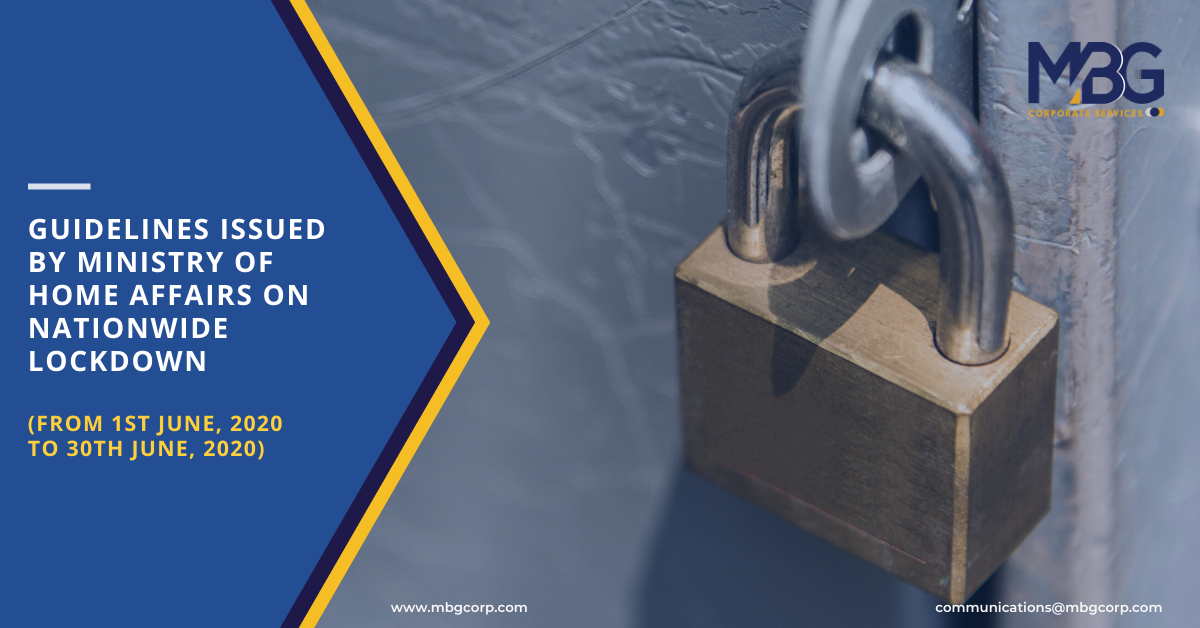GUIDELINES ISSUED BY MINISTRY OF HOME AFFAIRS ON NATIONWIDE LOCKDOWN (from 1st June, 2020 to 30th June, 2020)

a. Religious places/places of worship for the public.
b. Hotel, restaurants, and other hospitality services
c. Shopping malls
Ministry of Health and Family Welfare (MoHFW) will issue SOPs for the above activities, in consultation with the Central Ministries/Departments concerned and other stakeholders, for ensuring the social distancing and to contain the spread of COVID-19. Phase –II: A decision the re-opening of schools, colleges, educational/ training/coaching institutions, etc., will be taken based on the feedback from consultation among State Governments and Union Territories (UTs) and State Governments and UTs administrators with parents and stakeholders at the institution level. MoHFW will issue SOPs for the above activities, in consultation with the Central Ministries/Departments concerned and other stakeholders, for ensuring the social distancing and to contain the spread of COVID-19. Phase –III: Based on the assessment of the situation, the decision on the re-opening of below activities would be taken:a. International passenger air travel;
b. Metro Rail;
c. All cinema halls, theaters, bars, gymnasiums, swimming pools, assembly halls and similar places, etc
d. All social/political/sports/entertainment/academic/cultural.
2. Lockdown limited to Containment Zonesa. Lockdown shall continue in the Containment Zones till 30th day of June 2020;
b. Demarcation of containment zones by the District authorities after taking into consideration, the guidelines for MoHFW;
c. Only the essential activities are allowed within the Containment Zones. There would be intensive contact tracing, house-to-house surveillance, and other clinical interventions, as required. Guidelines of MoHFW shall be taken into consideration for the above purpose;
d. States and UTs may also identify Buffer Zones outside the Containment Zones, where new cases are more likely to occur. Within the buffer zones, restriction, as considered necessary, may be put in place by the District authorities.
3. Night Curfew The movement of people shall be strictly prohibited between 9 p.m. to 5 a.m. except for essential activities. Local authorities to issue necessary orders in their entire area of jurisdictions, under appropriate provisions of law, and ensure strict compliance. 4. Protection of vulnerable persons The below category of vulnerable persons to stay at home (except for essential and health purposes):a. Persons > 65 years of age;
b. Children < 10 years of age;
c. Pregnant Women;
d. Persons with co-morbidities.
5. Use of Aarogya Setua. As Aarogya Setu enables early identification of potential risk of infection, employers, on best effort basis to ensure Aarogya Setu is installed by all employees;
b. District authorities may advise individuals for the installation of Aarogya Setu application. This will facilitate the timely provision of medical attention to those individuals who are at risk.
6. Unrestricted movement of persons and goodsa. No restriction on inter-state and intra-state movement of persons and goods. No separate permissions/ approval/e-permit will be required for such movement;
b. However, if a state/UT, based on reasons of public health and its assessment of the situation, proposes to regulate the movement of persons, it will give wide publicity in advance regarding the restrictions to be placed on such movement, and the related procedures to be followed;
c. Movement by passenger trains and Shramik Special Trains; domestic passenger air travel; the movement of Indian Nationals stranded outside the Country and of specified persons to travel abroad; evacuation of foreign nationals; and sign-on and sign-off of India seafarers will continue to be regulated as per SOPs issued;
d. No state shall stop the movement of all types of goods/ cargo for cross land- border under Treaties with neighboring countries.
7. Miscellaneous Guidelinesa. State/UTs, based on their assessment of the situation, may prohibit certain activities outside the Containment Zones, or impose such restrictions as deemed necessary;
b. State/UT Governments shall not dilute these guidelines issued under the Disaster Management Act, 2005, in any manner;
c. All the District Magistrates shall strictly enforce the above measures.
Key pointers of National COVID-19 directives:a. Wearing of face masks is made compulsory in all public, workplaces and during transport;
b. Individuals must maintain a minimum distance of 6 feet (2 gaz ki doori) in public places;
c. Shops will ensure physical distancing among customers and will not allow more than 5 persons at the shop.
d. Gatherings at marriages shall ensure social distancing and the maximum numbers allowed shall not be 50;
e. Gatherings at funeral shall ensure social distancing and the maximum numbers allowed shall not be 20;
f. Spitting at public and workplaces shall be punishable with fine;
g. Consumption of liquor, Pan, gutka, tobacco, etc. in public places is prohibited.
Additional directives for Workplaces:a. As far as possible, the practice of work from home should be followed;
b. Staggering of work/ business hours shall be followed in offices, workplaces, shops, markets, and industrial and commercial establishments;
c. All workplaces to have adequate arrangements for thermal screening, hand wash, sanitizers at all entry and exit gates;
d. Frequent Sanitization of the entire workplace, common facilities, and all points which come into human contact;
e. All persons in charge of workplaces will ensure the adequate distance between workers, adequate gaps between shifts, staggering the lunch breaks of staff, etc.
Penal provisions Any person violating these lockdown measures will be liable to be proceeded against as per the provisions of Section 51 to 60 of the Disaster Management Act, 2005, besides legal action under Section 188 of the Indian penal Code, 1860, and other legal provisions as applicable. The complete text of the order may be viewed at below link: https://www.mha.gov.in/sites/default/files/MHAOrderDt_30052020.pdf Last Updated: 4th June 2020 This article is contributed by: Luv Malhotra Senior Manager, LegalTag: Nationwide Lockdown


